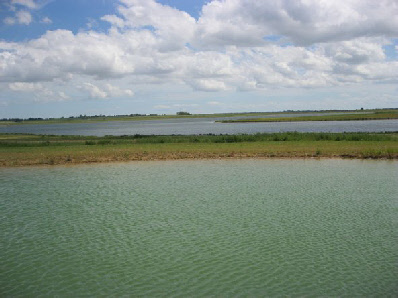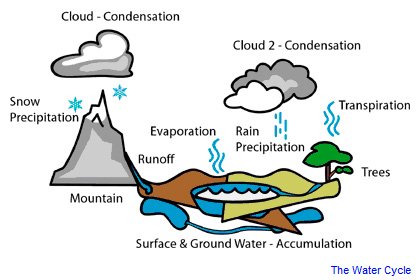Talk to us here at Rochford Life : 0786 342 7294 or E-mail us. For other numbers see individual pages.


Make a point of visiting us weekly! Tell a friend about us.
“Thinking Green” Pages
Giving a little thought to Saving Water
Giving a little thought to Saving Water
To return to the Series Contents Page, please CLICK HERE
We love pictures of water, but how we take it for granted!
“Water is essential for all dimensions of life. Over the past few decades, use of water has increased, and in many places water availability is falling to crisis levels. More than eighty countries, with forty percent of the world’s population, are already facing water shortages, while by year 2020 the world’s population will double. The costs of water infrastructure have risen dramatically. The quality of water in rivers and underground has deteriorated, due to pollution by waste and contaminants from cities, industry and agriculture. Ecosystems are being destroyed, sometimes permanently”
(World Bank Institute
WATER POLICY REFORM PROGRAM - Nov. 1999)
“Water is essential for all dimensions of life. Over the past few decades, use of water has increased, and in many places water availability is falling to crisis levels. More than eighty countries, with forty percent of the world’s population, are already facing water shortages, while by year 2020 the world’s population will double. The costs of water infrastructure have risen dramatically. The quality of water in rivers and underground has deteriorated, due to pollution by waste and contaminants from cities, industry and agriculture. Ecosystems are being destroyed, sometimes permanently”
(World Bank Institute
WATER POLICY REFORM PROGRAM -
Anglia Water says,
“On average, we each use 145 litres every day, in our cups of tea, our washing, and our baths and showers, but we're each indirectly responsible for using thousands more - through things like the production of our food, drink and clothes.
This region is the fastest growing in the UK, and tomorrow's forecast is for even more unpredictable weather. Which means to secure your water supply for the future, we are asking families, businesses and communities to help save water today to make sure we all have enough tomorrow.
For example, cutting water use by 20 litres each, every day - that's the equivalent of two full buckets - would make all the difference. And we'll be doing our bit too.
We want to lead the way in raising awareness about the value of water and campaign to change fundamentally how we all engage with it and use it.
Will you help us - please - to put water at the heart of a whole new way of living?
TAKE CARE OF THE DROPS... SO THE LITRES LOOK AFTER THEMSELVES
Here are some simple but effective ways that you can start.
JUST A FEW LITTLE STEPS AROUND THE HOME CAN SAVE LOTS OF LITRES – HOW MUCH COULD YOU SAVE?
IT ALL ADDS UP
At home, we each use an average of 145 litres of water a day. Some of this is wasted through inefficient appliances or dripping taps. We're asking everyone to try to drop that amount by 20 litres a day - the equivalent of two full buckets.
IN THE BATHROOM
A better brusher: Turning off the tape when you brush your teeth for two minutes can save 12 litres
Shower power: A typical shower uses 15 litres a minute - so shower for 60 seconds less each day to make a massive difference.
Hush the flush: A water displacement device in your toilet cistern saves 1.5 litres every time you flush
IN THE KITCHEN
Drop the drip: Fit a washer to that leaky tap and save up to three litres a day
Save and spin: Wash one full load in your washing machine instead of two half loads saves ten litres of water
Bowled over: A running tap uses 15 litres every minute - so try washing your fruit and vegetables in a bowl instead and save 12 litres
Feeling dishy: Dishwashers use around 15 litres of water per wash - if you have one, try putting it on once a day when it's full. This way you may use less water than if you wash up by hand two or three times a day
IN THE GARDEN
Keep it covered: Covering soil with pebbles, gravel or chipped bark keeps moisture in and weeds out
Grab a butt: Collecting rain water from your roof and downpipe in water butts to use in your garden will keep your beds blooming all summer
Less is more: Occasional but thorough watering helps make plants more resilient when it's dry
OUTSIDE THE HOUSE
Back to basics: Using a hosepipe to water the garden or wash the car uses a whopping 250 litres of water in 15 minutes - so why not use a watering can or bucket and sponge instead?
“On average, we each use 145 litres every day, in our cups of tea, our washing, and our baths and showers, but we're each indirectly responsible for using thousands more -
This region is the fastest growing in the UK, and tomorrow's forecast is for even more unpredictable weather. Which means to secure your water supply for the future, we are asking families, businesses and communities to help save water today to make sure we all have enough tomorrow.
For example, cutting water use by 20 litres each, every day -
We want to lead the way in raising awareness about the value of water and campaign to change fundamentally how we all engage with it and use it.
Will you help us -
TAKE CARE OF THE DROPS... SO THE LITRES LOOK AFTER THEMSELVES
Here are some simple but effective ways that you can start.
JUST A FEW LITTLE STEPS AROUND THE HOME CAN SAVE LOTS OF LITRES – HOW MUCH COULD YOU SAVE?
IT ALL ADDS UP
At home, we each use an average of 145 litres of water a day. Some of this is wasted through inefficient appliances or dripping taps. We're asking everyone to try to drop that amount by 20 litres a day -
IN THE BATHROOM
A better brusher: Turning off the tape when you brush your teeth for two minutes can save 12 litres
Shower power: A typical shower uses 15 litres a minute -
Hush the flush: A water displacement device in your toilet cistern saves 1.5 litres every time you flush
IN THE KITCHEN
Drop the drip: Fit a washer to that leaky tap and save up to three litres a day
Save and spin: Wash one full load in your washing machine instead of two half loads saves ten litres of water
Bowled over: A running tap uses 15 litres every minute -
Feeling dishy: Dishwashers use around 15 litres of water per wash -
IN THE GARDEN
Keep it covered: Covering soil with pebbles, gravel or chipped bark keeps moisture in and weeds out
Grab a butt: Collecting rain water from your roof and downpipe in water butts to use in your garden will keep your beds blooming all summer
Less is more: Occasional but thorough watering helps make plants more resilient when it's dry
OUTSIDE THE HOUSE
Back to basics: Using a hosepipe to water the garden or wash the car uses a whopping 250 litres of water in 15 minutes -

How Much is There?
97% of the Earth’s water is salt water in the form of seas and oceans. Salt water cannot be used practically with our current water delivery or plumbing systems — to upgrade these systems to prevent corrosion would cost an astronomical amount. It also takes a great deal of energy (and money) to turn salt water into usable freshwater (known as desalinization) and only a select few economically wealthy nations are able to afford this.
This leaves 3% of the Earth’s water supply, of which 2% is unavailable to us. This 2% is trapped in ice at the north and south poles, in glaciers, or is located too deeply underground where it is not easily accessible.
What remains is a mere 1% of the Earth’s total water supply that is freshwater and easily available in one form or another for our use. It’s easy to see how over 6 billion people can have a great influence on this small percentage of the Earth’s water supply.
(Canadian web-site)
97% of the Earth’s water is salt water in the form of seas and oceans. Salt water cannot be used practically with our current water delivery or plumbing systems — to upgrade these systems to prevent corrosion would cost an astronomical amount. It also takes a great deal of energy (and money) to turn salt water into usable freshwater (known as desalinization) and only a select few economically wealthy nations are able to afford this.
This leaves 3% of the Earth’s water supply, of which 2% is unavailable to us. This 2% is trapped in ice at the north and south poles, in glaciers, or is located too deeply underground where it is not easily accessible.
What remains is a mere 1% of the Earth’s total water supply that is freshwater and easily available in one form or another for our use. It’s easy to see how over 6 billion people can have a great influence on this small percentage of the Earth’s water supply.
(Canadian web-
All the other suggestions on the right of this page come courtesy of Anglia Water
